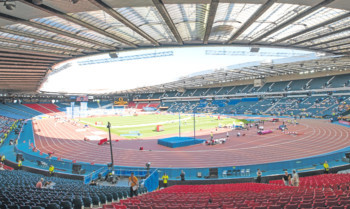
Scotland’s “summer of sport” will see more than 600,000 extra tourists visit the country, pouring hundreds of millions of pounds into the economy.
A new analysis by The Sunday Post shows around 43% of the one million tickets sold for Glasgow 2014 went to sports fans outside of Scotland.
In addition, two thirds of the 250,000 spectators expected at September’s Ryder Cup will be from the rest of the UK or overseas.
The surge in visitors could land a short-term boost of more than £100m to Scotland’s economy. This would be on top of the longer-term legacy of first-class sports facilities and jobs for the country created by both events.
Business and tourism bosses last night said Scotland is sitting on a gold mine of economic opportunity, with a string of other sporting events such as this weekend’s international athletics meeting in Glasgow coming to the country on the back of the Games.
Malcolm Roughead, chief executive of VisitScotland said: “2014 presents a unique opportunity. Up to one million spectators and thousands of additional visitors are estimated to descend on Glasgow for the Commonwealth Games and more than 250,000 spectators from 75 countries are expected to attend The Ryder Cup over the course of the week. Add to that the thousands of people who will attend or participate in remarkable sporting events across Scotland this summer, such as the Sainsbury’s Glasgow Grand Prix, the Aberdeen Asset Management Scottish Open, the Tour o’ the Borders, the Great Scottish Swim and Baxters Loch Ness Marathon & Festival of Running to name but a few this truly is an unprecedented time for our country to shine.
“Not only will local accommodation, visitor attractions, restaurants and more benefit in the short term from our summer of sporting activities, huge worldwide television and online audiences will tune in to catch up on all the action. This is the perfect opportunity to showcase Scotland as a destination for leisure and business tourism.”
VisitScotland figures show visitors from the rest of the UK to Scotland stay for an average of three days and spend an average of £59 per night. With more than 600,000 visitors expected for the Ryder Cup and Commonwealth Games, this could add £106m to Scotland’s economy.
However, the haul is likely to be much higher as tourists from overseas tend to spend much more.
A full review of Glasgow 2014’s economic legacy will kick off next month but the Scottish Government estimates the Games have already generated 6,000 jobs and a £52m boost to Scotland’s economy. It is estimated the Ryder Cup being staged at Gleneagles in September will be worth a total of £100m.
Stuart Mackinnon, Public Affairs Advisor with the Federation of Small Businesses in Scotland, said: “Scotland’s summer of sport is a huge opportunity for our members to show off the warm welcome the country is famous for but also the excellent products and services we have to offer.
“Even those in non-tourism businesses have the opportunity, through both UK and Scottish Government initiatives, to tap into business from Commonwealth countries during the Games.
“In our surveys, all of our members have said they can see this as a big opportunity for Scotland even if they are not directly affected.”

Enjoy the convenience of having The Sunday Post delivered as a digital ePaper straight to your smartphone, tablet or computer.
Subscribe for only £5.49 a month and enjoy all the benefits of the printed paper as a digital replica.
Subscribe